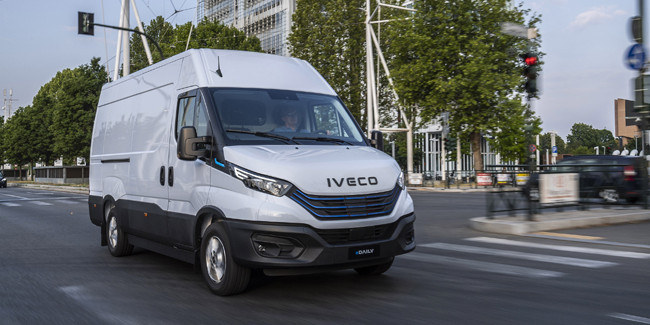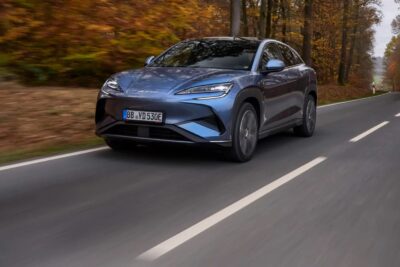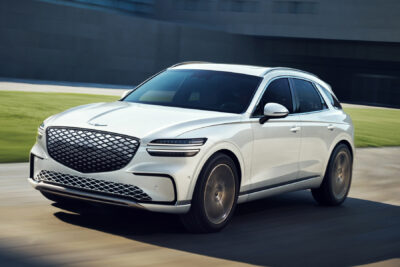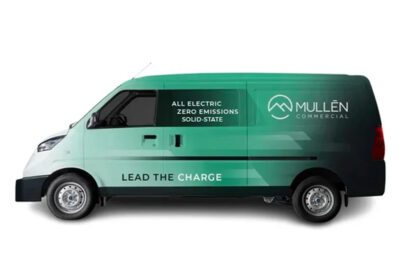Iveco presents the electric transporter eDaily
Iveco has published the technical details of the eDaily. The company is currently exhibiting the battery-electric van as well as a fuel cell variant at the IAA Transportation. Iveco also announced the first customer for the BEV model: Petit Forestier has ordered 2,000 units.
With the eDaily, Iveco has emphasized versatility: The electric vehicle will be launched on the market in panel van, chassis, double cab, cowl, cutaway and minibus versions. The panel van version alone is available in five lengths and three heights. Iveco also offers single or twin tyres. The former supports vehicle variants with 3.5, 3.8 and 4.25 tonnes, the latter those with 4.25, 5.2, 6 and 7.2 tonnes gross vehicle weight.
In terms of battery options, one to three battery packs can be installed. Each pack has a capacity of 37 kWh, resulting in a maximum battery capacity of 111 kWh. The energy storage units feed a rear engine with 140 kW peak power (100 kW with only one battery installed) and 400 Nm peak torque (300 Nm with one battery). The range varies according to vehicle weight and battery capacity and is 110 to 300 kilometres according to WLTP. In city traffic, up to 400 kilometres should be possible. The top speed stands at 120 km/h.
The battery is charged with 11 kW AC as standard, but 22 kW AC is also available as an option. The eDaily can also be fast-charged as an option: The maximum DC charging power is 80 kW for the variants with two and three battery packs, and 40 kW for the variant with one pack. Regarding charging time, Iveco states that AC charging with 11 kW takes nine hours with three batteries and is reduced to five hours with 22 kW. With DC charging, the battery pack is 80 per cent full again in less than 90 minutes (with one or two batteries: 60 minutes).
Iveco guarantees the batteries for eight years with “long mileage limits and guaranteed battery replacement if the battery capacity drops to 80% or less due to normal wear and tear”. The company does not specify the manufacturer of the batteries or the cell chemistry.
A payload of up to 4.6 tonnes is possible for the Daily, as well as a towing capacity of up to 3.5 tonnes and a load volume of up to 20.3 cubic metres. In the panel van version, the vehicle is between 5.2 and 7.7 metres long and offers an interior height between 1.55 and 2.1 metres. The wheelbases vary between 3 and 4.1 metres. For the chassis, a total of six wheelbases between 3 and 4.75 metres are available, which can be combined with several platform lengths. The weight varies in both cases between 3.5 and 7.2 tonnes.
Iveco has also announced further model variants such as the double cab and the minibus. An adaptive chassis with air suspension on the rear axle, the charging plug at the front, ePTOs up to 15 kW and a Hi-Power for short-term power boosts are included on all versions of the vehicle.
Like most manufacturers, Iveco is building a service ecosystem around its electric van to help customers get started with e-mobility. Services include apps for route planning, monitoring and charge planning. And Iveco has already convinced its first customer with this overall package: at the IAA Transportation, the manufacturer signed a letter of intent with the Petit Forestier Group, a rental company for refrigerated vehicles. In the paper, both sides fix the targeted delivery of 2,000 eDaily units as chassis.
Delivery of the first 200 units is planned for 2023, with the other 1,800 units to follow by 2026. The vehicles will be equipped with refrigerated bodies from Lecapitaine, a subsidiary of Petit Forestier.
A few days ago, Iveco had already published details of a fuel cell variant of the Daily developed together with Hyundai. The hydrogen transporter can currently also be seen in Hanover. A small series of the Iveco transporter with Hyundai fuel cell is to be built by the end of 2023.
With reporting by Cora Werwitzke, France.
iveco.com (Petit Forestier), edaily.iveco.com (eDaily)





0 Comments